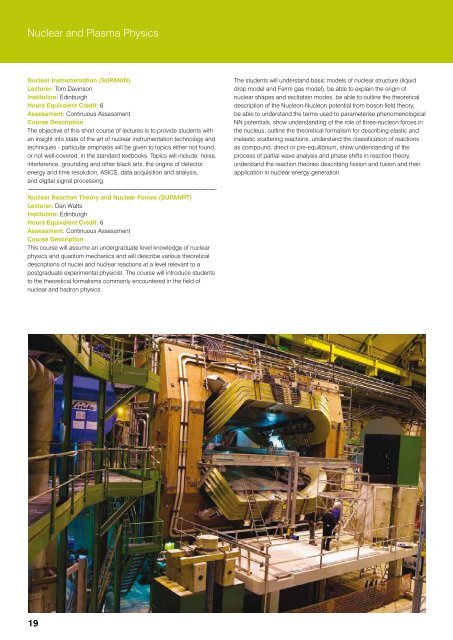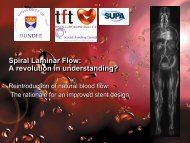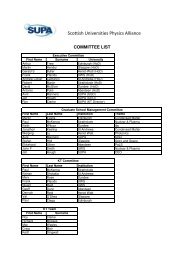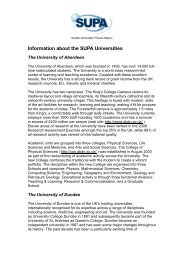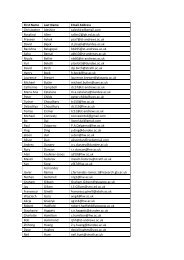Catalogue of Courses & Student Handbook - SUPA
Catalogue of Courses & Student Handbook - SUPA
Catalogue of Courses & Student Handbook - SUPA
Create successful ePaper yourself
Turn your PDF publications into a flip-book with our unique Google optimized e-Paper software.
Nuclear and Plasma Physics<br />
Nuclear Instrumentation (<strong>SUPA</strong>NIN)<br />
Lecturer: Tom Davinson<br />
Institution: Edinburgh<br />
Hours Equivalent Credit: 6<br />
Assessment: Continuous Assessment<br />
Course Description<br />
The objective <strong>of</strong> this short course <strong>of</strong> lectures is to provide students with<br />
an insight into state <strong>of</strong> the art <strong>of</strong> nuclear instrumentation technology and<br />
techniques - particular emphasis will be given to topics either not found,<br />
or not well-covered, in the standard textbooks. Topics will include: noise,<br />
interference, grounding and other black arts, the origins <strong>of</strong> detector<br />
energy and time resolution, ASICS, data acquisition and analysis,<br />
and digital signal processing.<br />
The students will understand basic models <strong>of</strong> nuclear structure (liquid<br />
drop model and Fermi gas model), be able to explain the origin <strong>of</strong><br />
nuclear shapes and excitation modes, be able to outline the theoretical<br />
description <strong>of</strong> the Nucleon-Nucleon potential from boson field theory,<br />
be able to understand the terms used to parameterise phenomenological<br />
NN potentials, show understanding <strong>of</strong> the role <strong>of</strong> three-nucleon forces in<br />
the nucleus, outline the theoretical formalism for describing elastic and<br />
inelastic scattering reactions, understand the classification <strong>of</strong> reactions<br />
as compound, direct or pre-equilibrium, show understanding <strong>of</strong> the<br />
process <strong>of</strong> partial wave analysis and phase shifts in reaction theory,<br />
understand the reaction theories describing fission and fusion and their<br />
application in nuclear energy generation.<br />
Nuclear Reaction Theory and Nuclear Forces (<strong>SUPA</strong>NRT)<br />
Lecturer: Dan Watts<br />
Institution: Edinburgh<br />
Hours Equivalent Credit: 6<br />
Assessment: Continuous Assessment<br />
Course Description<br />
This course will assume an undergraduate level knowledge <strong>of</strong> nuclear<br />
physics and quantum mechanics and will describe various theoretical<br />
descriptions <strong>of</strong> nuclei and nuclear reactions at a level relevant to a<br />
postgraduate experimental physicist. The course will introduce students<br />
to the theoretical formalisms commonly encountered in the field <strong>of</strong><br />
nuclear and hadron physics.<br />
19


